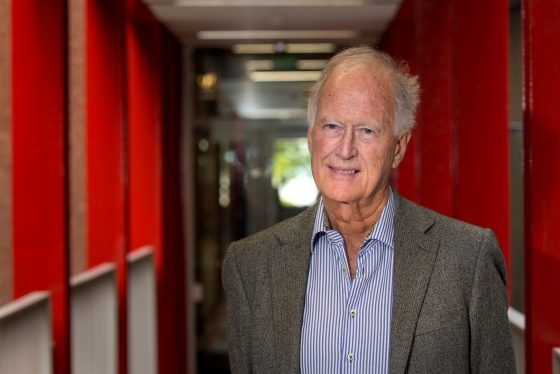News
Published 23 November 20162016 Rutherford Medal: Understanding the Human Mind

‘Why is the left hemisphere of the brain different from the right hemisphere?’, ‘How did language evolve?’, ‘What is memory for?’. These are the questions that have occupied Emeritus Professor Michael Corballis ONZM FRSNZ, who has been awarded the Rutherford Medal by the Royal Society of New Zealand for his research spanning 50 years.
The Rutherford Medal is the highest honour awarded by the Royal Society of New Zealand and acknowledges a lifetime of significant scholarly research and the promotion of this knowledge to the benefit of New Zealand society. It comes with a prize of $100,000 from the government.
The medal selection panel said Professor Corballis had made significant contributions in the areas of evolution, linguistics and neuropsychology related to understanding the human mind, applying mathematics, physics, philosophy, genetics, neuroscience and evolutionary biology to approach his research questions.
Professor Corballis is well known for his work on asymmetries in the brain, identifying the differences in function between the two cerebral hemispheres. His research into this has included behavioural studies, brain imaging and genetics studies to determine how the hemispheres specialise for complex computation as required for language and as demonstrated by the phenomena of being right- or left-handed. Recent studies in identical twins, who don’t always have the same handedness, has led to new understanding about what role genes play in producing brain asymmetry.
He has championed the theory that human capacity for complex verbal language emerged from gestural communication in early hominins, gathering many supporters over time.
Another area where Professor Corballis’s research is well known is in understanding the evolution of the human mind’s capacity for ‘mental time travel’, a term coined by him and his then student Thomas Suddendorf, describing the human ability to think about both past and future events.
These two strands of research have been increasingly drawn together as he has suggested that language and the ability to conceive of events in time may have mutually driven evolution of the human mind.
In addition to his academic writing, Professor Corballis has written a string of popular books including: The Lopsided Ape, From Hand to Mouth, The Recursive Mind, Pieces of Mind and The Wandering Mind. These titles have made the latest thinking on difficult topics such as the origins of human language, mental time travel and the question of human uniqueness easily accessible to a broad audience.
He said he was “honoured and flattered” to receive the medal.
Professor Corballis has been based at the School of Psychology at the University of Auckland since 1966, becoming Professor Emeritus in 2008, except from 1968 to 1977, when he was based at McGill University in Montreal, Canada. He is a Fellow of the American Association for the Advancement of Science, the Association of Psychological Scientists, the American Psychological Association and the Royal Society of New Zealand. He is an Honorary Fellow of the International Neuropsychology Symposium and the New Zealand Psychological Society. He was awarded the Shorland Medal from the New Zealand Association of Scientists in 1999, a James Cook Research Fellowship from the Royal Society of New Zealand in 2000 and the Hunter Award from the New Zealand Psychological Society in 2006. He was made an Officer of the New Zealand Order of Merit in 2002.
Rutherford Medal:
For an exceptional contribution to the advancement and promotion of knowledge of science and technology for the benefit of New Zealand society. This medal is the highest honour awarded by the Royal Society of New Zealand.
Citation:
To Michael Charles Corballis for foundational research on the nature and evolution of the human mind, including cerebral asymmetries, handedness, mental imagery, language, and mental time travel.
